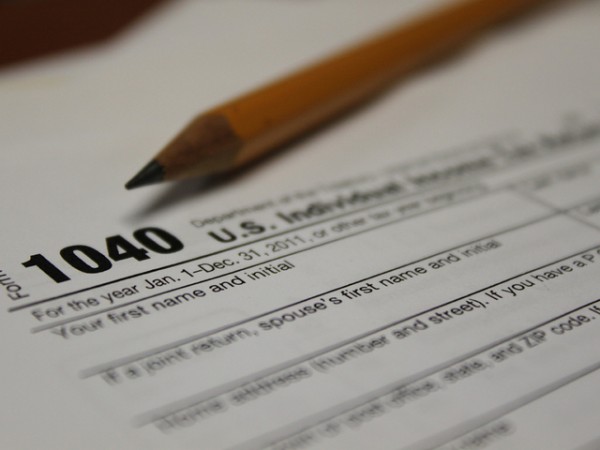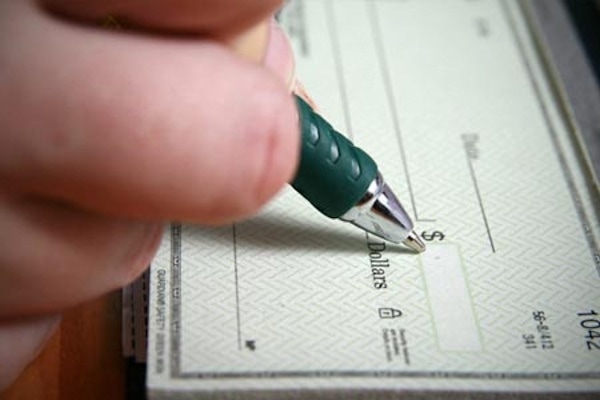
Have you filed your taxes yet? I’m always anxious to get started as soon as all of the forms come in (the nerd in me actually enjoys tax returns), and our tax refund has been sitting in the bank for two weeks now.
This year I grabbed a deal on H&R Block software, which saved a lot of money. In the past I’ve spent over $100 to file taxes online (the basic versions usually don’t cut it when you’re self-employed), but this year I was able to get the software I needed, H&R Block Premium & Business, for just $38.99 on Amazon.com.
I typically use either H&R Block or TurboTax, depending on which is cheapest any given year. It’s free to input your data on either site (as long as you don’t file), so I always use both to compare results and ensure my maximum refund. I think TurboTax is slightly more user-friendly, but this year it was much more expensive.
All of the financial experts say that you should adjust your withholdings to have as small a refund as possible; why give the government your money interest-free when you could invest it instead? I completely agree, but for a variety of reasons I failed to adjust our withholdings like I intended during 2013 and we ended up with a sizeable refund (thanks in part to the arrival of our newest tax deduction bundle of joy).
Two years ago we were able to leverage our tax refund to start our debt snowball rolling, and we paid off our remaining debt within one year. This year isn’t quite as exciting, but we’ll still be using our money to ensure financial security, and that makes me happy.
Special Occasion Fund
Last year I started a Special Occasion Fund placed in a high-interest savings account to use for birthdays, holidays and other special occasions throughout the year. It gives me peace of mind knowing that no matter what our financial situation may be during any given month, we already have the money set aside to buy gifts and celebrate life’s happy moments.
I wrote down all of the occasions that we usually shop for, including birthdays in our immediate family and some extended family, holidays like Valentine’s Day and Easter, and of course Christmas. We’ve always had set budgets for gift-giving, so I simply added those numbers together to arrive at a target amount.
I had a little bit extra left in our fund at the end of the year, so I didn’t need to transfer the full amount from our tax refund. Now we’re set for another year.
Sink Fund

Next, I bumped up the balance of our Sink Fund. This is the account we use for recurring expenses that we pay with checks (like my husband’s parking costs, pet grooming and church donations). I calculated the amount we would need for the recurring expenses for one year.
I’ll add more to the Sink Fund throughout the year whenever we have some extra money. That way, we can pay for pricey expenses, that aren’t part of our normal budget, with cash. Hopefully we’ll be able to save enough to cover minor emergencies, to avoid dipping into our official Emergency Fund.
Cell Phones
Several years after I first wrote about how we spend $200 per year for two cell phones, my husband and I are still chugging along on that plan. In fact, I think we could really do without cell phones at all, but I like my husband to have one during the winter, and I want to be reachable wherever I may be now that my oldest is in school.
I refill our accounts with our tax refund when I have a big sum of money to use. The $100 refills are valid for one full year, and we never use all the minutes. Yeah, we’re weird, but it works for us and saves a ton of money.
Emergency Fund
Finally, the majority of our refund went into our Emergency Fund account. We’ve been working on building an Emergency Fund for quite some time, but had to pull back on our savings rate due to baby and other expenses.
Originally I had been aiming to save six months worth of living expenses, but I recently decided that I felt comfortable with three months, for now. We’ll have enough to carry on our current standard of living if my husband were to lose his job, or to cover a significant expense like our old temperamental furnace finally calling it quits.
I was thrilled to realize that now we only have $1,100 to go until we have a fully funded three-month emergency fund! It shouldn’t be too difficult to find that remaining money over the course of the year to reach our goal (fingers crossed we don’t have any setbacks).
Short term sacrifices, long term gains

I’ll admit, it’s very tempting to want to splurge on something fun when I have a lump sum of money at my disposal. Years ago, I would do just that. But I’ve come to value financial security more than any fleeting luxury. I hope that being boring now will pay off down the road.
Image source: tax form, tvs, writing a check

“But I’ve come to value financial security more than any fleeting luxury,” is so wise. I’ve long thought the ability to delay gratification is one of my more useful traits; it helped me save all my life for the purposes you describe — and others less worthy. In 7th grade, my New Year’s resolution was to save all the candy I purchased or was given by others for a year, so I could celebrate the next Christmas by having more candy to eat than any other child in the world. I accomplished my goal, learned I have will power, and also discovered for myself that you can have too much of a good thing.
Thank you! I love your story about the candy. It’s great that you had that kind of will power and self-discipline at a young age.
I’m usually pretty boring with my tax refund and just put it into my RRSP, but there are definitely some new savings goals I’ll be implementing this year so it may go into those.
Boring is often a good thing when it comes to finances! Good luck with your new goals.
We put our refund into our ing account. Usually, we have a big project. Not this year.